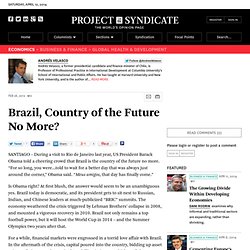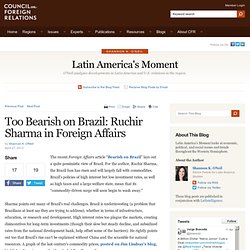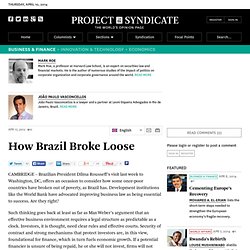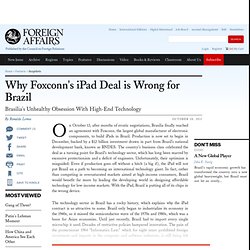

Brazil's New Swagger - By David Rothkopf. While America's halting path toward accepting the world's new multipolar reality involves a step backward for every step forward, an exceptionalist violation of sovereignty for every bit of teamwork in places like Libya, other countries are actively working to establish new rules for all nations to follow in the new era.

Among those at the forefront of this effort are Brazilian President Dilma Rousseff and her highly regarded foreign minister, Antonio Patriota. He was in New York last week to advance this effort at the United Nations, and we sat down for lunch together. The challenge facing Rousseff and Patriota as public servants is a daunting one.
Each follows in the footsteps of a formidable predecessor. "Brazil, Country of the Future No More?" by Andres Velasco. Exit from comment view mode.

Click to hide this space SANTIAGO – During a visit to Rio de Janeiro last year, US President Barack Obama told a cheering crowd that Brazil is the country of the future no more. “For so long, you were...told to wait for a better day that was always just around the corner,” Obama said. “Meus amigos, that day has finally come.” Bearish on Brazil. Until recently, the consensus view of Brazil among investors and pundits was almost universally bullish. Under the landmark presidency of Luiz Inácio Lula da Silva, the country became known as a paragon of financial responsibility among emerging markets. Having contained hyperinflation and reduced its debt, Brazil weathered the 2008 financial crisis better than most, growing at an average annual rate of nearly four percent over the past five years.
And in the last ten years, some 30 million Brazilians have entered the middle class, giving their country, according to Brazil's promoters, the power to expand despite a turbulent global environment and to reduce income inequality even as it grew elsewhere in Latin America. This decade of success has made Brazil one of the most hyped emerging-market nations, with one of the two top-performing stock markets in the world and receiving more foreign direct investment than most other countries. To continue reading, please log in. Register. Latin America's Moment » Too Bearish on Brazil: Ruchir Sharma in Foreign Affairs. The recent Foreign Affairs article “Bearish on Brazil” lays out a quite pessimistic view of Brazil.

For the author, Ruchir Sharma, the Brazil fuss has risen and will largely fall with commodities. Brazil’s policies of high interest but low investment rates, as well as high taxes and a large welfare state, mean that its “commodity-driven surge will soon begin to wash away.” Sharma points out many of Brazil’s real challenges. Brazil is underinvesting (a problem that Brazilians at least say they are trying to address), whether in terms of infrastructure, education, or research and development. High interest rates too plague the markets, creating disincentives for long-term investments (though their slow but steady decline, and subsidized rates from the national development bank, help offset some of the barriers). Commodity Prices 1900-2011, Source: McKinsey Global Institute But this take on Brazil and many of his subsequent conclusions miss the broader story. "How Brazil Broke Loose" by Mark Roe and João Paulo Vasconcellos.
Exit from comment view mode.

Click to hide this space CAMBRIDGE – Brazilian President Dilma Rousseff’s visit last week to Washington, DC, offers an occasion to consider how some once-poor countries have broken out of poverty, as Brazil has. Development institutions like the World Bank have advocated improving business law as being essential to success. Are they right? Such thinking goes back at least as far as Max Weber’s argument that an effective business environment requires a legal structure as predictable as a clock. Why Foxconn's iPad Deal is Wrong for Brazil. On October 13, after months of erratic negotiations, Brasilia finally reached an agreement with Foxconn, the largest global manufacturer of electronic components, to build iPads in Brazil.

Production is now set to begin in December, backed by a $12 billion investment drawn in part from Brazil’s national development bank, known as BNDES. The country’s business class celebrated the deal as a turning point for Brazil’s technology sector, which has long been marred by excessive protectionism and a deficit of engineers. Unfortunately, their optimism is misguided: Even if production goes off without a hitch (a big if), the iPad will not put Brazil on a path to becoming an international technology giant. Carnaval Is Over - By Bill Hinchberger.
When she strides into the White House on Monday, Brazilian President Dilma Rousseff will carry with her one thing sure to draw the envy of her American counterpart Barack Obama -- a whopping 77 percent approval rating. Sitting pretty as a BRIC, at the top of the world, the darling of international investors, preparing to host the 2014 World Cup and the 2016 Olympic Games, Brazil is caught up in a national adrenaline rush comparable -- stereotypically, perhaps -- to what Carnaval dancers feel when they march amid the cheers into Rio de Janeiro's Sambadrome.
The euphoria was evident at most recent edition of the World Economic Forum's confab in Davos, where Brazilian taxpayers bankrolled the official Saturday night soirée. Davos often features country-specific sessions, and Brazil got one again this year. The chief conclusion seemed to be that officials should not let the economy overheat. Special Report: Brazil's gringo problem: its borders.